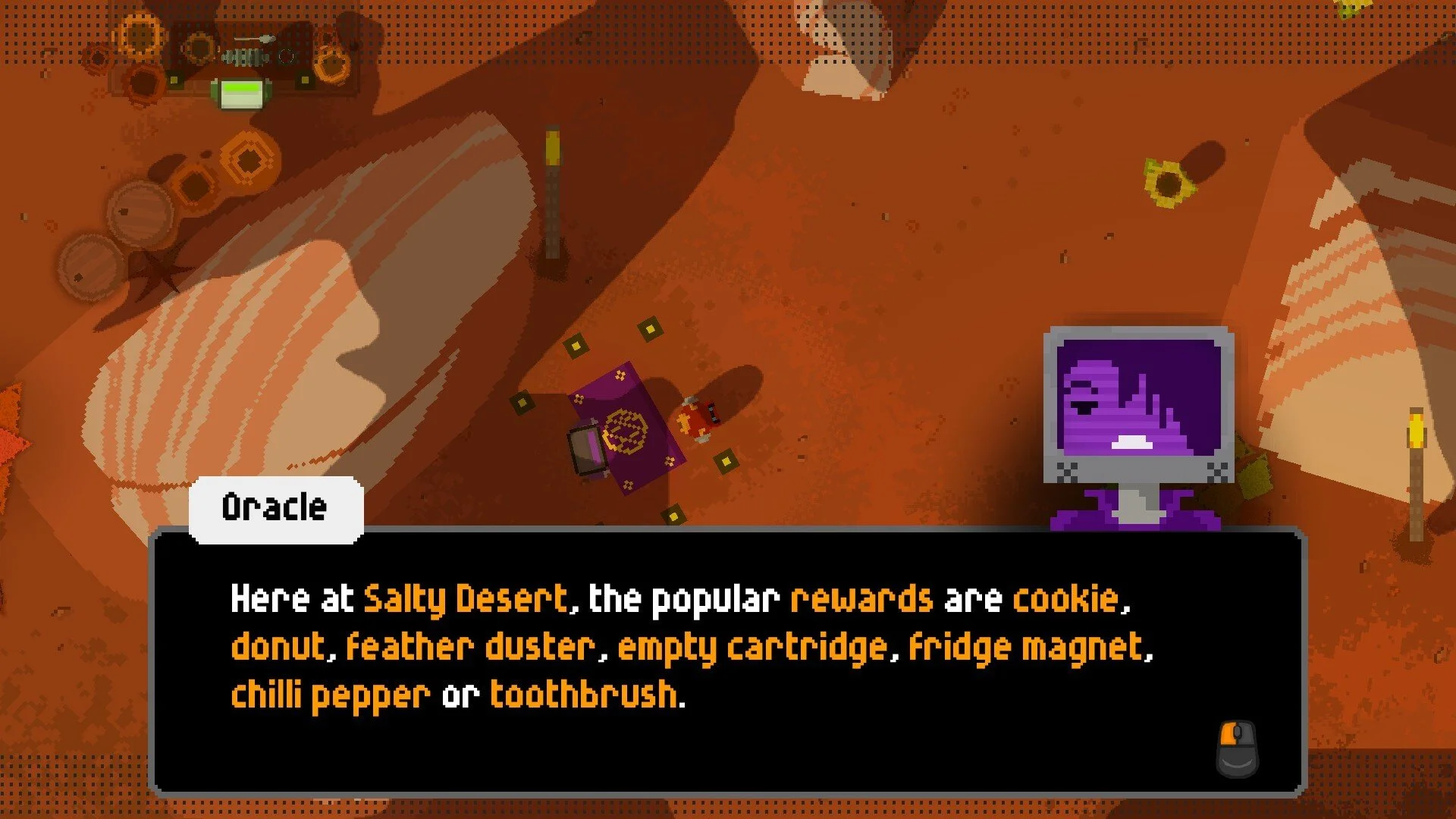FixFox
Nathan Schmidt, Contributing Editor
When I first booted up FixFox (Rendlike/Joystick Ventures), I thought I had a pretty good sense of what I was getting into. I was a cute pixel-art foxperson in space, working for a company where my job is to—you guessed it—fix stuff. I figured there would be a fair amount of inventory management, maybe the occasional puzzle or two as I wandered around the galaxy looking for parts and moving from job to job. I prepared myself for this. Then, in the first five minutes of the game, I ate some pudding. My sentient toolbox companion got worried that there might have been space germs in the pudding, so he blew me out of the airlock just to, you know, make sure I was safe from the space germs.
Shortly afterwards, I found myself in a fix-it race against ultra-religious robots who were convinced that all forms of unauthorized repair work blasphemed the will of the gods. My imagination had been too small for FixFox.
This is not to say that I didn’t have to do any inventory management in FixFox. I did, but a conceit of the game is that your coworkers just call you the Fixfox ironically because you’re bad at your job (your real name is Vix). Your talking toolbox coworker is happy to accept pretty much anything you find, but the game shows your inventory with a graphical interface that realistically jumbles things over and under each other, emulating the real world experience of rifling through a messy backpack. The chaos was not quelled by the fact that I found myself regularly performing fix-it jobs with items like band-aids and bananas.
Instead of putting you in the position of a rote inventory manager, Fixfox leans hard into the quirk factor, and often succeeds. The game follows a narrative that quickly strands you on a faraway planet from which you must fix your way back home, meeting a number of robots along the way (as far as I’ve played, all major NPCs have been robots). There is an overarching narrative that involves a giant corporation, ultra-robots that control human lives in various ways, and a backstory where climate change causes all humans to develop certain mammalian features. Managing all these story threads is a little ambitious for a game where much of the actual play is spent trawling a large planet for parts that will solve relatively simple “complete the circuit”-type puzzles. Sometimes FixFox flies a little too close to the narrative sun, but it's hard to do anything but grin when you get tips on how to complete difficult jobs by letting a robot feed you soup.
The one major dissatisfying thing about FixFox was related to game mechanics—one specific mechanic, to be precise. It’s fun to be able to play with creative possibilities for fixing things with all the wacky stuff that will eventually be in your inventory, but a lot of potential for inventiveness is stolen from the player by the insertion of characters called “oracles.” When you find new items, you bring them to these robots, who will tell you what fixit-related attributes your little scraps and space detrita may have. In other words, you can’t just find a band-aid and use it as tape; you have to go find an oracle to tell you that the band-aid has the “sticky” attribute before you can put it to use. I recognize the utility of such a mechanic in a tool-based game where many of your tools are a little obscure, but I found that level of handholding to be stifling. Especially since Vix is supposed to be canonically bad at fixing things, I found myself wanting more opportunities to try outrageous things on my own and see if they fail, to just stick a banana in the back of the microwave and see what happens.
At its best, however, FixFox is a lovely addition to the subgenre of games that Polygon has called “science fiction with blue-collar aesthetics and characters.” Like Hardspace Shipbreaker, Fixfox lets you play a working-class protagonist who has some bones to pick with the corporate space overlords, and like critical darling Outer Wilds, the soundtrack by Aleix Ramon has just enough banjo in it to invoke the Appalachian coal mines and the famous labor struggles that have taken place within them. Sci-fi games that imagine a future centered on labor are having something of a renaissance right now, and even though FixFox has its ways of keeping things lighthearted, it’s still a welcome entry into a much-needed canon. It imagines a narrative world in which space travel isn’t the sole purview of technocratic elites, where the (fox)people who actually make things happen and keep things running are front and center. It’s a trend that I really hope to see stick around for a long time: less hotshot pilots and space wizard Chosen Ones, more games where you’re glad somebody’s around who knows how to make things work.






